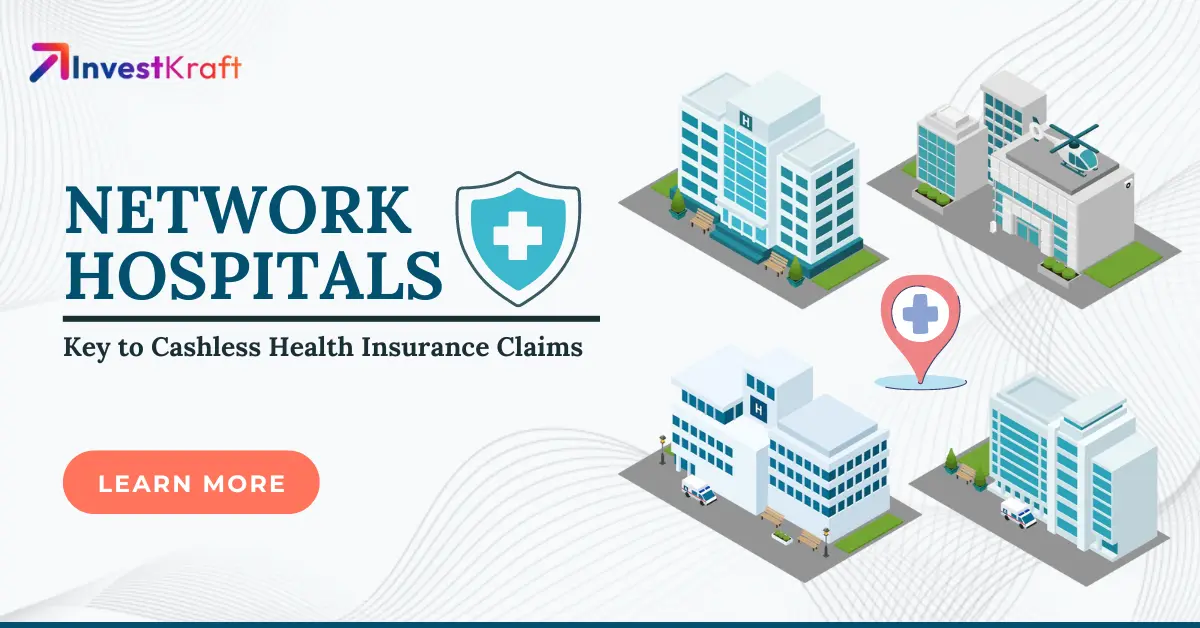Understanding Network Hospitals and Their Benefits in Health Insurance Claims

Health insurance is crucial for managing medical expenses and protecting your hard-earned savings. In a world where health issues are prevalent, investing in a comprehensive health insurance policy that meets your medical needs is imperative. Health insurance not only offers financial stability but also grants access to high-quality healthcare without any upfront costs during emergencies or treatments, thanks to the cashless claim process available at network hospitals. Continue reading to discover the significance of network hospitals and how they benefit you.
What is the Definition of Network Hospitals?
A network hospital is a specific type of healthcare facility that has established a direct contractual agreement with your health insurance provider, ensuring seamless transactions for policyholders. Thanks to this agreement, when you require hospitalization at a network hospital, you can benefit from cashless hospitalization services, which means you won’t need to pay any medical expenses upfront.
Instead, the insurance company takes on the responsibility of settling the bill directly with the hospital on your behalf, following the terms and conditions outlined in your policy. This arrangement not only simplifies the payment process but also alleviates the financial burden during what can often be a stressful time.
What is the Role of Insurance Companies in Establishing Network Agreements?
Insurance companies play a vital role in forming network agreements in India, which is essential for enabling cashless healthcare services for policyholders. Below are the key responsibilities and functions they uphold -
- Network Provider Agreements: Insurance companies establish partnerships with hospitals and healthcare providers, referred to as network providers, to deliver cashless services to policyholders. These agreements outline the conditions under which medical services are rendered, detailing the rates applicable for a range of treatments.
- Service Level Agreements (SLAs): SLAs play a crucial role in defining the relationship between insurers, third-party administrators and network hospitals. These agreements outline the range of services provided, establish tariff rates and clarify the responsibilities of each party involved. Additionally, they incorporate termination clauses and specify the conditions that could lead to claim denial.
- Regulatory Compliance: Insurance companies are required to adhere to the regulations set forth by the Insurance Regulatory and Development Authority of India (IRDAI). This includes the obligation for insurers to forge agreements with an adequate number of network providers, ensuring comprehensive geographical coverage and easy accessibility for policyholders.
- Cashless Facility Implementation: Insurers play a crucial role in establishing cashless services at the network hospitals, enabling policyholders to receive medical treatment without the burden of upfront payments. The insurer directly handles the settlement of hospital bills according to the terms outlined in the network agreement.
- Grievance Redressal Mechanism: Insurers are required to implement effective systems for addressing complaints regarding cashless facilities. This ensures that any challenges encountered by policyholders in accessing healthcare services at network providers are resolved swiftly and efficiently.
- Standardization Efforts: The insurance sector is advancing towards the establishment of a unified cashless network for all health insurance policies. This initiative aims to standardize rates, streamline the claims process for policyholders, enhance transparency and mitigate fraud.
- Continuous Communication: Insurers consistently engage with network providers to ensure adherence to SLA agreements and to promptly resolve any service-related concerns that may emerge while treating policyholders.
- Empanelment Processes: The empanelment of hospitals entails negotiations between insurers and healthcare providers to establish mutually acceptable terms of service pricing and quality standards, which are essential for the hospitals’ inclusion in the insurer’s network.
- Market Competition: By broadening their network of partner hospitals, insurers not only bolster their market reputation but also draw in a greater number of policyholders. N extensive network offers consumers more choices when it comes to health insurance coverage, making it a more appealing option.
- Financial Management: Forming network agreements empowers insurers to secure more favourable rates with hospitals by ensuring a steady flow of patients. This strategy not only helps manage claim-related costs but also enhances the value of services offered to policyholders.
What are the Benefits of Network Hospitals in Health Insurance?
Network hospitals are integral to the health insurance landscape in India, offering a wide array of benefits to policyholders. Below are some significant advantages of utilizing network hospitals -
- Cashless Hospitalization: Patients can undergo treatment without upfront payments, as the insurance company will settle the bills directly with the hospital.
- Simplified Claims Process: Claims are handled more effectively thanks to established partnerships between insurers and network hospitals.
- Quality Assurance: Insurance companies rigorously evaluate network hospitals to ensure they meet high-quality standards, guaranteeing that policyholders receive dependable and top-notch medical care.
- Wide Range of Services: Numerous network hospitals provide an extensive array of services, featuring specialized treatments and cutting-edge medical technologies.
- Access to Top Hospitals: Policyholders typically gain access to prestigious and highly regarded hospitals within the insurance network, significantly expanding their treatment choices.
- Pre-authorization Convenience: When scheduling planned hospitalization, obtaining pre-authorization from your insurer is generally simpler and faster when utilizing network hospitals.
- Emergency Support: In critical situations, patients can swiftly secure cashless treatment at network hospitals, alleviating the stress of immediate financial concerns.
- Reduced Financial Burden: By removing upfront expenses, network hospitals significantly ease the financial pressure on families in times of medical crises.
- Diverse Coverage Options: Network hospitals frequently engage with multiple health insurance plans, offering a broad spectrum of coverage choices designed to meet diverse needs.
- Post-Hospitalization Benefits: Numerous hospitals in our network offer seamless post-hospitalization care and follow-up treatments, all under a cashless arrangement.
- No Reimbursement Hassles: Patients can enjoy a hassle-free experience, avoiding the time-consuming and complex reimbursement claims often associated with treatment at out-of-network facilities.
- Ambulance Services: Certain network hospitals incorporate ambulance services into their offerings, guaranteeing prompt transportation in emergencies.
- Comprehensive Health Packages: Network hospitals are likely to provide health packages that encompass preventive care, diagnostics and wellness programmes, all covered by insurance.
- Family Coverage Options: Numerous health insurance plans permit family members to be included under a single policy when receiving treatment at network hospitals, thereby enhancing the management of family health.
Further Reading: Top 10 Family Health Insurance Plans in India 2025
How Do Insurance Companies Select Network Hospitals and Criteria They Use
Insurance companies choose network hospitals based on a range of criteria designed to guarantee high-quality care and efficient services for their policyholders. Below is a comprehensive overview of the selection process and the criteria employed by these companies.
- Quality of Medical Services: Insurance companies evaluate hospitals for the quality of medical services, staff qualifications and advanced technology.
- Background Checks: A thorough background check ensures the hospital’s reputation and reliability by reviewing patient outcomes, safety records and regulatory compliance.
- Range of Specialties: Hospitals with diverse specialities are preferred, enabling insurance companies to offer policyholders multiple treatment options in one location.
- Financial Stability: The financial health of the hospital is also taken into account. Insurance companies prefer to partner with financially stable hospitals to reduce the risks associated with potential bankruptcy or closure.
- Cost Efficiency: Treatments and procedures are evaluated for market competitiveness to manage claims costs effectively.
- Patient Satisfaction: Patient satisfaction feedback influences decisions about including a hospital in the network.
- Geographic Coverage: Insurance companies seek diverse hospital networks across regions for easy access to care for policyholders.
- Cashless Facility Capability: Hospitals should enable cashless transactions, allowing insurance companies to settle bills directly, improving the customer experience during hospitalization.
What Happens After Health Insurers Include a Hospital in a Network?
When hospitals become part of a network, insurance companies closely track their performance over time. Systematic evaluations are carried out based on -
- Quality of Care: Continuous assessment of treatment results and standards of patient care.
- Service Updates: Hospitals are required to promptly notify insurers about any changes in the services or specialities they provide.
- Contractual Compliance: Guaranteeing that hospitals comply with the stipulations outlined in their contracts with insurance companies.
Should a network hospital fall short of quality standards or receive substantial complaints from policyholders, insurance companies might opt not to renew their contracts with those facilities.
Drawbacks or Limitations of Using Network Hospitals for Health Insurance Claims
Although network hospitals provide numerous benefits such as cashless treatment and pre-negotiated rates, it is important to recognize some of the potential drawbacks -
- Limited coverage - Insurance might not cover all costs at a network hospital, resulting in higher out-of-pocket expenses for the policyholder. Some treatments and medications may be excluded.
- Restricted choice - Policyholders must use hospitals in the insurer’s network, which may force compromises on location or quality if a preferred hospital is not included.
- Potential delays in approvals - For scheduled hospital admissions, it is necessary to secure pre-authorization from the insurance provider. Any holdups in this procedure may result in treatment postponements or require the policyholder to make upfront payments.
- Possibility of claim rejection - Claim rejection may occur if the hospital or treatment is not covered, leading the policyholder to pay out of pocket.
- Lack of transparency in pricing - Although network hospitals have pre-negotiated rates, there is insufficient clarity regarding how these prices are established. Policyholders may not be aware if they are receiving the best possible deal.
- Potential for overcharging - Hospitals may overcharge for services, causing policyholders to pay more than needed.
- Limited services covered - Cashless claims cover limited services, like room rent and doctor’s fees but exclude special meals, attendant charges and some medications.
- Restrictions on room type - Insurers may restrict cashless claims to basic or shared rooms, requiring policyholders to pay extra for private rooms.
- Possibility of claim deductions - Insurers have the right to subtract specific amounts from claims, including co-payments, deductibles and sub-limits, even at network hospitals.
- Dependence on the insurer's network - Dependence on the insurer’s network can restrict access to quality healthcare if it is limited. An extensive network with reputable hospitals is essential.
What Should You Do If There are No Network Hospitals Available for a Specific Treatment?
In the unfortunate event that no network hospitals are available for the specific treatment you require, it is essential to follow a detailed and organized approach to ensure you receive the necessary care.
- Assess Urgency and Necessity: Ascertain whether the situation requires immediate attention. In emergency circumstances, you might have to seek care at the closest non-network hospital, even if it requires an upfront payment.
- Contact Your Insurance Provider: Before moving forward, it is essential to connect with your insurance company to clarify your policy’s coverage regarding non-network hospitals. Inquire about the specific steps you need to take for reimbursement and confirm which expenses will be included in your coverage.
- Gather Documentation: Ensure that you have all the pertinent documents available such as admission forms, treatment bills, diagnostic reports and discharge summaries. These materials will be crucial for submitting a reimbursement claim in the future.
- Understand Out-of-Pocket Costs: Anticipate the possibility of increased costs when utilizing non-network hospitals, as they do not have pre-established agreements with insurers. Be aware that certain services may not be fully covered, depending on the specifics of your policy.
- File a Reimbursement Claim: After your treatment, promptly file a claim with your insurance provider, including all necessary documentation. This process can be lengthy, so be sure to follow up consistently to monitor the status of your claim.
- Consider Future Options: If you often need specialized treatments that are not offered at your current in-network hospitals, it is advisable to engage with your insurer about the possibility of those facilities or transitioning to a plan with a more extensive network.
Conclusion
In the healthcare sector, a robust health insurance policy serves as a crucial foundation for financial security. Network hospitals play a vital role in this ecosystem, delivering numerous advantages to policyholders. By facilitating cashless hospitalization and simplifying claims processes, as well as providing access to high-quality healthcare, network hospitals ensure that individuals feel secure and supported during medical emergencies.
Though there are certain limitations to consider, the benefits of leveraging network hospitals surpass any potential drawbacks. By comprehending the nuances of network hospital and their significance in health insurance, individuals can make well-informed choices to safeguard their well-being and financial stability.
Frequently Asked Questions (FAQs)
Q: What are network hospitals in insurance?
A: Network hospitals are healthcare facilities that establish partnerships with insurance companies to offer cashless treatment for insured patients. This agreement enables individuals to access medical services without the need for upfront payment, as the insurance provider directly handles the billing with the hospital.
Q: What is the use of networks in hospitals?
A: Hospital networks enable efficient access to medical services for insured patients, allowing them to receive treatment without incurring immediate out-of-pocket expenses. This not only improves patient convenience and satisfaction but also strengthens the relationship between healthcare providers and insurers, fostering greater loyalty.
Q: How can insured individuals obtain information about network hospitals and procedures?
A: Insured individuals can easily access information regarding network hospitals and procedures by visiting their health insurance provider’s website or contacting customer service. Numerous insurers also provide mobile applications and online portals, enabling policyholders to search for network facilities and gain insights into the claims process.
Q: Can we claim health insurance from a non-network hospital?
A: Yes, insured individuals have the option to seek health insurance coverage from non-network hospitals. However, they are required to pay the hospital bill upfront and subsequently claim with their insurance provider. It is important to note that cashless facilities are usually not offered at non-network hospitals, which can complicate the reimbursement.
Q: What is the primary purpose of considering network hospitals while choosing health insurance?
A: When selecting health insurance, it is essential to consider network hospitals as they offer cashless treatment options. This means that policyholders can access medical care without having to make upfront payments. Such arrangements often result in reduced costs due to pre-negotiated rates and contribute to a more efficient claims process, ultimately improving access to affordable healthcare.
Q: What is the difference between a network hospital and an agreed hospital?
A: The key distinction between a network hospital and an agreed hospital is primarily in their definitions. Network hospitals maintain formal agreements with insurance companies for cashless treatments, whereas agreed hospitals, often called preferred hospitals, provide comparable benefits and may also offer extra perks or discounts for policyholders.
Q: What is Anh in insurance?
A: In the context of insurance, “ANH” stands for “Agreed Network Hospitals”. These are healthcare facilities that have established formal agreements with insurance companies. This arrangement enables policyholders to enjoy cashless treatment, where the insurer takes care of the medical bills directly, eliminating the need for upfront payments from the insured.
Q: What is PPN in health insurance?
A: "PPN" refers to the "Preferred Provider Network" in health insurance, signifying a selection of healthcare providers who have committed to offering services at discounted rates for insured patients. Consequently, individuals usually enjoy out-of-pocket expenses when they seek care from PPN facilities rather than from non-network providers.
Q: How do you claim health insurance in a hospital?
A: To access health insurance benefits during a hospital stay, patients are required to present their health insurance ID card to the billing department at the time of admission. The hospital will subsequently conform the policy with the insurance provider, facilitating cashless treatment whereby the insurer directly covers the medical expenses.
Q: How does a hospital network work?
A: A hospital network comprises a collection of hospitals that work together through agreements with insurance companies to offer services such s cashless treatments. These networks enhance patient care by allowing insured individuals to receive medical services without the need for upfront payments, as the costs are managed directly between the hospital and the insurer.
Q: What is the new rule for cashless claims?
A: The newly introduced guideline for cashless claims requires patients to notify their insurance provider within 24 hours of hospitalization. This prompt communication allows insurers to efficiently process claims and approve cashless treatments at network hospitals, thereby simplifying the payment process for medical services.
Q: Can we claim medical bills in insurance without hospitalisation?
A: Yes, medical bills can indeed be claimed even without hospitalization, provided that the insurance policy includes coverage for outpatient treatments or specific procedures. It is essential for patients to carefully review their policy details to ascertain which non-hospitalization expenses qualify for claims under their health insurance plan.
Q: What is TPA in insurance?
A: TPA, or Third-Party Administrator, is an organization that oversees health insurance claims on behalf of insurers. They serve as a crucial link between policyholders and insurers, streamlining processes such as claim approvals and reimbursements while ensuring adherence to policy terms.
Q: What is co-payment in health insurance?
A: Co-payment in health insurance denotes the share of medical expenses that the policyholder must cover out-of-pocket when filing a claim. This amount is usually set as either a fixed percentage or a predetermined sum, effectively lowering the insurer’s financial responsibility for each claim submitted by the insured.

Author: Abhik Das
Abhik Das is a versatile content writer with over 5 years of experience crafting engaging and informative content across diverse industries. His expertise spans the fields of ed-tech, pharmaceuticals, organic food, travel, sports, and finance.
Here's what sets Abhik apart:
Content Versatility: Able to adapt writing style and tone to suit various audiences and content needs.
SEO Proficiency: Creates content optimized for search engines, ensuring discoverability and organic traffic.
Deep Research: Conducts thorough research to ensure content accuracy and credibility across complex topics.
Engaging Storytelling: Captures reader interest with clear, concise, and compelling writing.
Abhik's diverse background empowers him to deliver insightful content across a wide range of subjects. Whether you're seeking engaging explainer pieces on the latest financial trends, informative guides to organic food choices, or captivating travelogues, Abhik has the expertise to craft content that resonates with your audience.




















